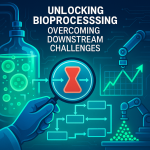🤝 Collaboration can address risks from pandemics and geopolitical issues. Improved infrastructure and funding are essential for this transition.
🔬 Innovative solutions such as biofoundries and precision fermentation can enhance sustainability and reduce costs in various industries.
Introduction:
This article discusses the challenges and strategies surrounding the scaling of synthetic biology, a field aiming to revolutionize the production of pharmaceuticals, agricultural products, and other commodities through genome engineering of microbial platforms. The transition from laboratory success to commercial viability relies heavily on enhancing manufacturing efficiency and addressing supply chain vulnerabilities.
- The ambition of synthetic biology includes overhauling cellular genomes to create platforms for producing essential goods while minimizing environmental impact.
- The article emphasizes the importance of shifting focus from disruptive innovation to cohesive development, fostering strong partnerships with governmental bodies to ensure stability in supply chains.
- Current drug shortages, particularly in essential medications sourced from international suppliers, underscore the necessity for improved domestic manufacturing capabilities.
- The U.S. government’s initiatives, including the National Biotechnology and Biomanufacturing Initiative, aim to bolster biomanufacturing efforts but require effective execution to be successful.
- Advancements in biofoundries, precision fermentation, and strain engineering offer pathways for synthetic biology to overcome economic barriers and enhance production efficiency at scale.
Conclusion:
The future of synthetic biology hinges on successfully implementing innovative manufacturing solutions while maintaining a cohesive approach that strengthens supply chains. Government support and strategic collaborations are crucial for addressing existing challenges, particularly drug shortages. As synthetic biology transitions to large-scale applications, there lies potential for responsible and sustainable production within various industries, ultimately benefitting public health and environmental sustainability.



